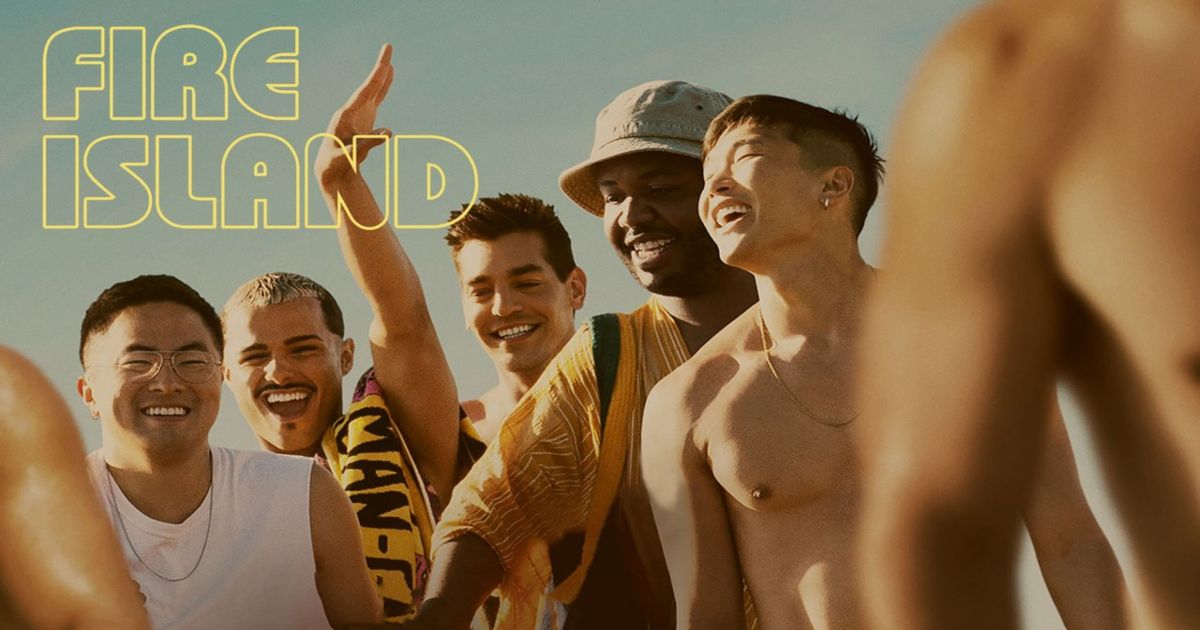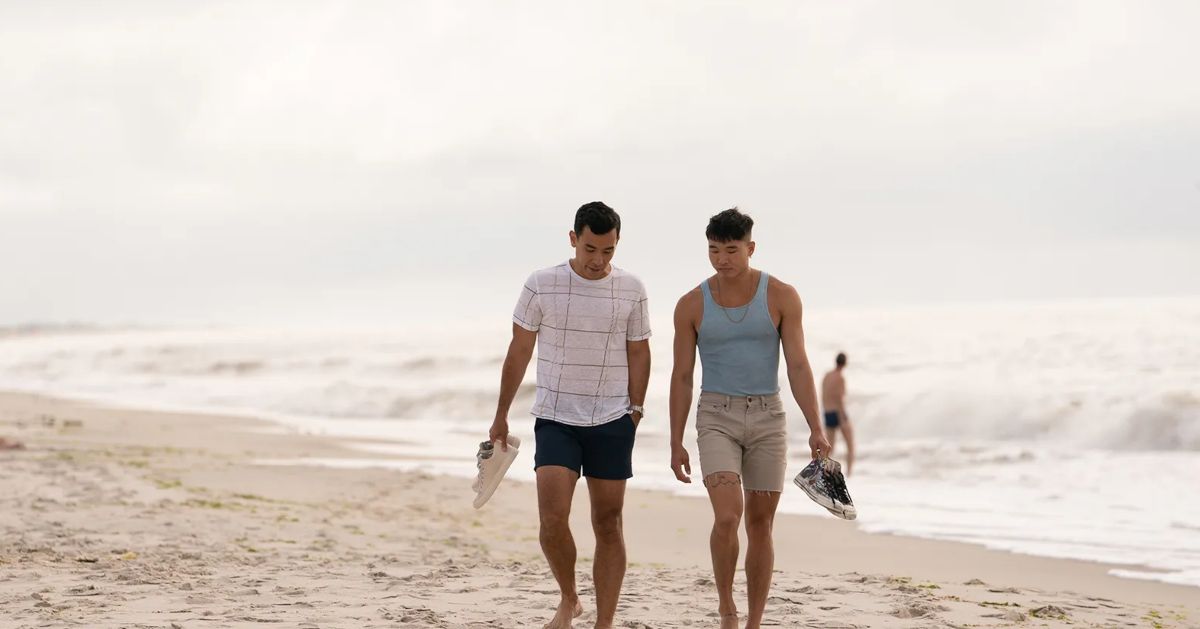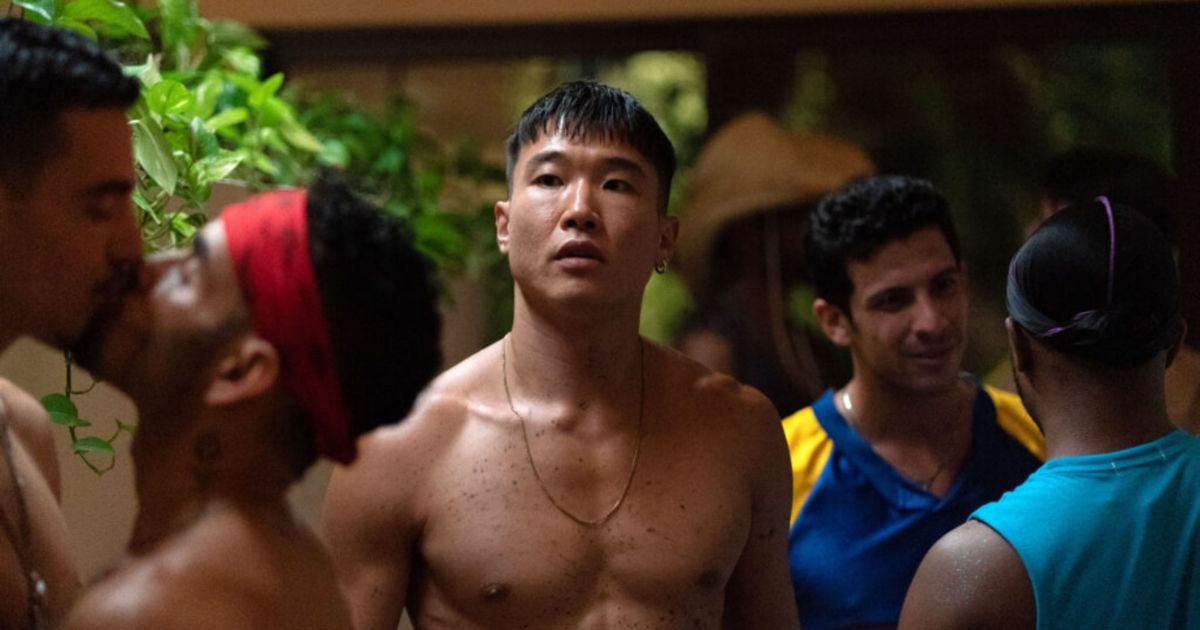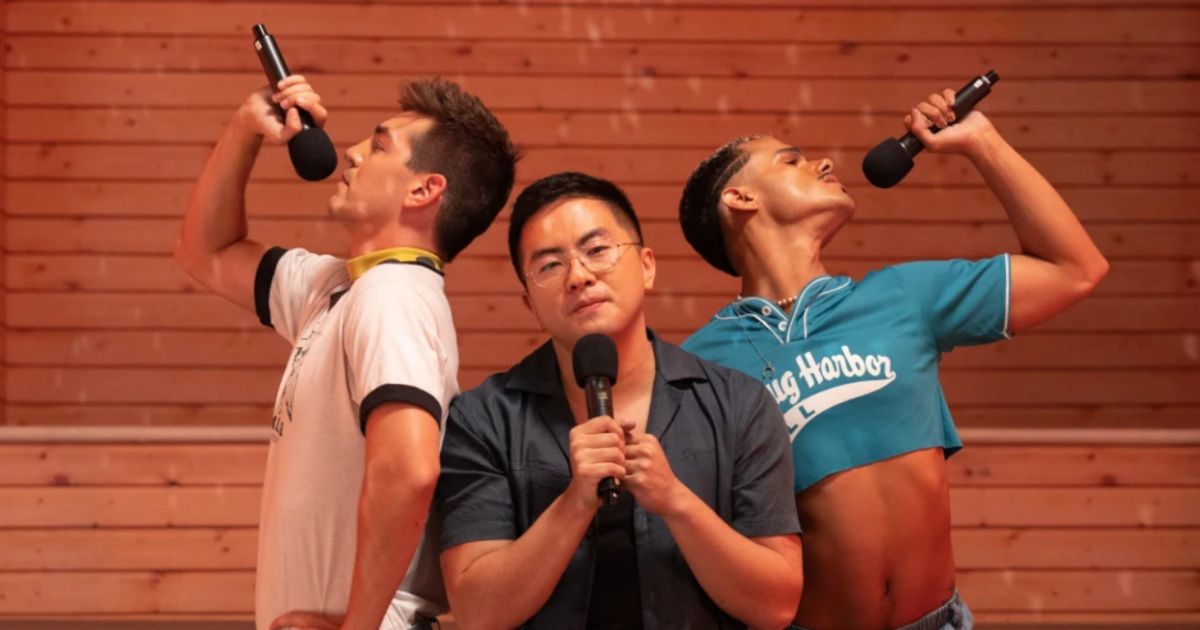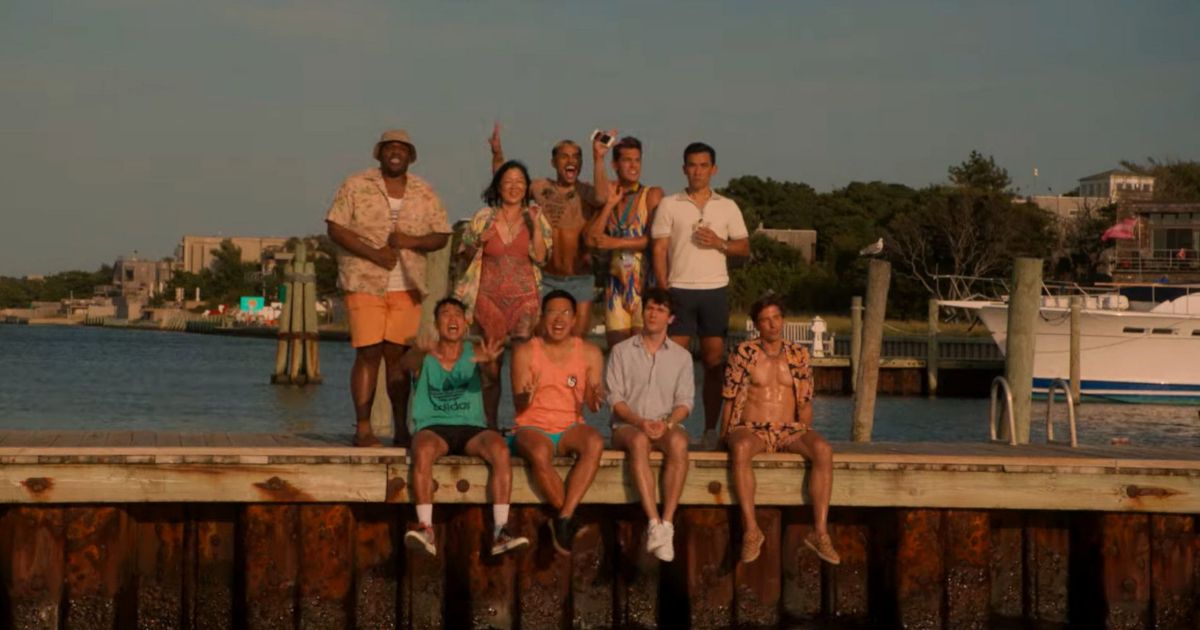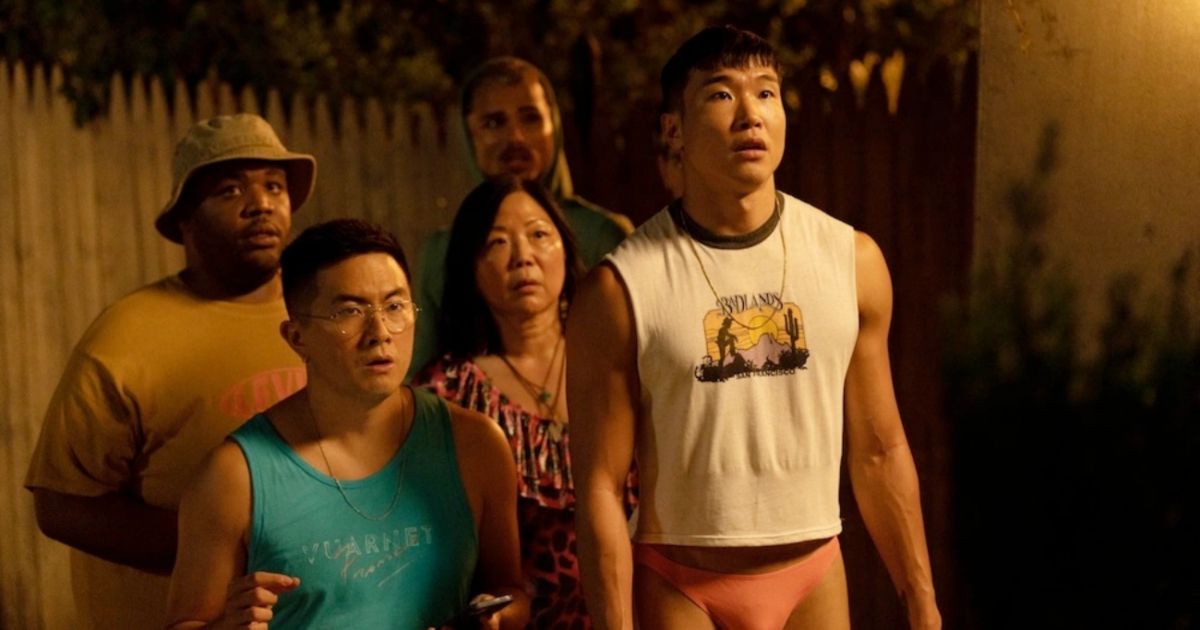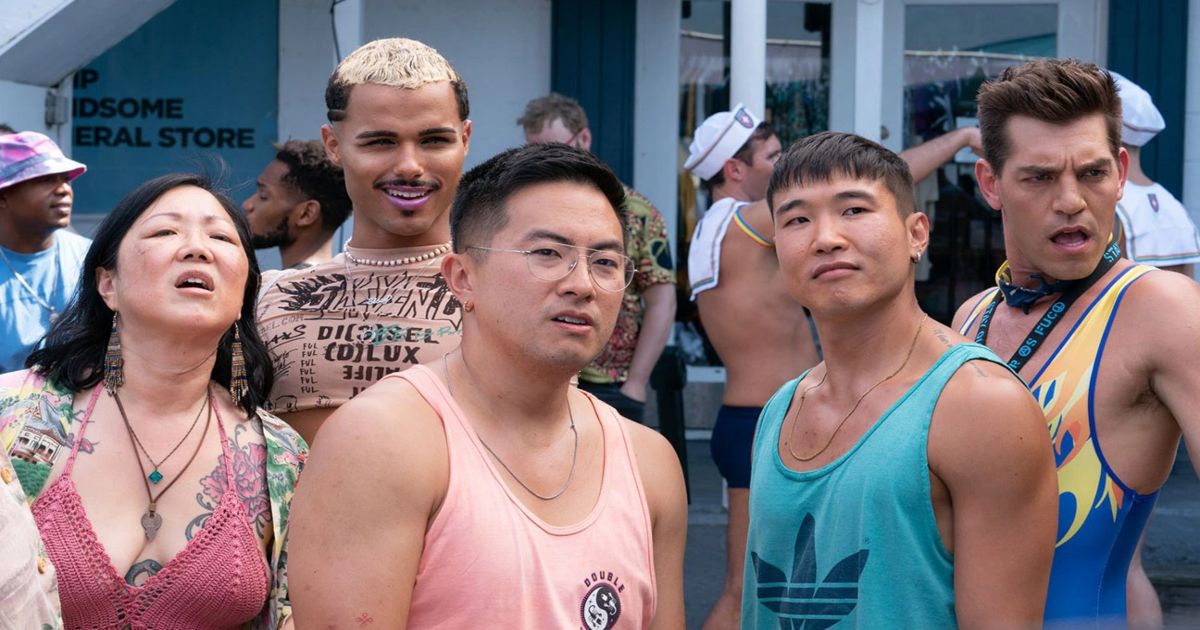Joel Kim Booster, the writer and star of the new Hulu film Fire Island, wrote a wonderful autobiographical piece for Penguin Random House, in which he describes the titular gay destination spot:
Fire Island is widely known throughout the gay community as one of two things: a Mecca-like summer destination full of gorgeous architecture and bronzed hard bodies, or a nightmarish summer stock production of all our worst impulses as modern gay men: racism, substance abuse, and depraved sexual activity. Both versions are more or less correct depending on your perspective, but ultimately it is what you make it.
His often hilarious film, directed by Andrew Ahn and loosely based on Pride and Prejudice, expertly explores this divide (between class, race, sexuality, and more) in a way many queer films tend to avoid, and for understandable reasons. However, Fire Island does this in the most subtle of ways and, like the Jane Austen novel on which it's loosely based, manages to be very entertaining and just as appealing to people who are simply looking for a good time as it is to any intellectual. It's a very funny, very gay, and often very sharp movie even when it's self-admittedly diving deep into the waters of the stupidest rom-com clichés.
Going to Fire Island
Fire Island follows the week-long vacation of a group of lower-income friends who travel to the vacation destination each year, where queer people have been congregating and communing for decades. Fire Island was a safe haven location for the LGBTQ+ community ever since the mid-20th century, when often closeted or persecuted gay and lesbian people would get together to be themselves in a non-judgmental environment at a time when homosexuality was essentially illegal.
What makes Fire Island so interesting is the way that it observes this hallowed gay community in contemporary times. The LGBTQ+ community is not a monolith, and has many of the exact same problems as the rest of society, something Fire Island (drawing from Pride and Prejudice) carefully maps out. The biggest issue of all, perhaps, is classism, and the economic inequality which divides people even within a marginalized community; class is ultimately the largest barrier, and it can tear apart even the oppressed.
Booster plays Noah, who is based on Austen's character Elizabeth Bennet. Noah's friends arrive at a home on the island owned by their matriarch of sorts, Erin (played by a delightful Margaret Cho and based on Mrs. Bennet), who is facing financial difficulties after blowing most of the money she received from a lucrative con job. This means that the house must be sold, and that this might consequently be the last summer on Fire Island for the group of slowly aging but beautiful friends, who have been naturally drifting as the gravity of life's responsibilities sends them apart. The week on the island is a promise of sorts, a dream of liberation sweaty with sex, drugs, laughs, and love.
Fire Island Queers the Traditional Rom-Com
Of course, Fire Island is filled with the typical subplots of rom-coms and cheesy romance movies (which have all been influenced by Austen, to varying degrees) — Noah tries to hook his best friend up, he has a love-hate relationship with a somewhat secretive man he'll obviously end up with, the kooky supporting friends get into misadventures, arrogant villains rear their heads as rich-boy bullies, this might be their last time together, and so on. Fortunately, this is all done very well with efficiency, thanks to tight editing and a refined and honed script.
What really makes Fire Island work is how it tenderly subverts these myriad romance movie tropes using queer actors and people of color, who all give exceptional performances. Booster has said that he wrote Fire Island because he knew he'd never be cast in a Pride and Prejudice adaptation, so he decided to make his own inclusive, queer version where he (and his friends) could truly shine, and they really do.
Bowen Yang, Conrad Ricamora, and the Rest of Fire Island's Great Cast
Bowen Yang, as Noah's best friend Howie (based on Jane Bennet), is the real stand-out here. Yang has proven himself to be arguably the best new hire on Saturday Night Live in the past few years, consistently bringing great energy and an iconoclastic presence to even the weaker sketches, and he truly proves here that he has star power. He's incredibly funny, but in an entirely effortless way that's actually kind of cool and sexy, even when he's playing someone who's sometimes utterly awkward.
His character is a well-written, multifaceted person who is simultaneously against dominant, heteronormative ideologies, but also one who embraces his rom-com ideals of true, monogamous love. Yang is simply perfect, whether he's making a joke or the butt of it, lashing out in anger or wallowing in self-pity.
It'd be unfair to say that Yang steals the show, however, since the cast is composed of truly winning performances. Conrad Ricamora is a big surprise here, perfectly sliding into the role of Mr. Darcy from Pride and Prejudice, but with a deeper kindness and a less toxic presence behind the stoicism of that famous character. Playing Will, he both contrasts and compliments Noah perfectly, and theirs is one of the few will-they-or-won't-they relationships that doesn't become frustrating and repetitive, because the actors and their characters bounce off each other in great ways.
The supporting cast is all great in smaller roles, from the perfectly bitchy Nick Adams as Cooper (based on Caroline Bingley) to the hilarious and inseparable duo of Matt Rogers' Luke and Tomás Matos' Keegan (based on Lydia and Kitty Bennet, respectively). Cinematographer Felipe Vara de Rey does a great job capturing the veritable sea of toned bodies while still managing to distinguish the major characters, and pairing them all with the beautiful beachside shots and sunset scenery of Fire Island. The music from Jay Wadley creates a smile-inducing atmosphere, almost like a remix of a Mark Mothersbaugh score, and the soundtrack is filled with classic gay anthems to further set the scene.
Fire Island and Pride and Prejudice
"No one understands gay social mores like Austen, and no one is quite as funny or exacting while sketching them," Booster writes in his aforementioned article, and it's clear how personal the Pride and Prejudice story is to the writer and star of Fire Island. He continues:
What all these heroines have in common, a journey that every gay man at every level of our deeply toxic, imaginary caste system can relate to, is seeing all the ridiculous rules that were created for you, that you’ve somehow internalized, and finally recognizing them as false. Austen detractors — sad, literary meatheads — have often complained loudly about a lack of real “conflict” in her stories. And bless them, but maybe what they’re not connecting to is that struggle. The long, arduous path that each of Austen’s heroes goes through to not only hold on to the love they’ve found but to believe themselves worthy of it.
Fire Island may be a far cry from a traditional Pride and Prejudice adaptation, but Colin Firth eat your heart out, because it truly gets the issues inherent in Austen's text. It understands how societies get divided by the cruel cliques and tragic traditions which seem to inevitably crop up, even in the most 'liberated' queer places. "In our community," Booster's character Noah says, "money isn't the only form of currency. Race, masculinity, abs — just a few of the metrics we use to separate ourselves into upper and lower classes."
Fire Island Isn't Afraid to Criticize
Beneath every romantic gesture and rom-com trope in Fire Island lurks the bleeding heart of class consciousness. The insecurities from people with less money, and the postures of power from those with more, ricochet throughout the film in a subtle but effective way. To detail these themes within the subgenre of queer cinema is rather bold; there seems to be a subliminal imperative in even great queer films never to criticize the LGBTQ+ community in any way, because historically they have been attacked so hatefully.
But Booster and director Andrew Ahn know that class transcends practically every other label, and to disregard the ways in which it infects and destabilizes even marginalized communities is important and authentic. "The place is a playground for superficial, vapid morons," Will says about Fire Island, unaware of the power imbalance that follows him wherever he goes as an incredibly rich man. He's right, and he's wrong.
Fire Island shows that there are still abusers, arrogant tools, and cruel bullies in the LGBTQ+ community, often thriving as a result of economic inequality. The film also shows the beautiful people, though, the flawed and funny heroes who are just trying to navigate this often difficult and awful world and still have a good time. Watching Fire Island, you'll have a good time, too.
From Searchlight Pictures, Fire Island is now streaming on Hulu as of June 3rd, just in time for Pride Month.

